Theories of Health: Social Constructionism, Well-being & Feminism
VerifiedAdded on 2023/06/15
|7
|2226
|384
Essay
AI Summary
This essay discusses the concepts of health, social constructionism, well-being, and feminism and their implications for healthcare. It explains how social constructionism shapes understanding of the world, emphasizing the cultural and historical context of knowledge. Well-being is defined as a combination of physical, emotional, social, and mental factors, influenced by various aspects of life. The feminism approach assists public health practitioners in understanding the health of men and women by addressing social factors like gender stereotypes. The essay concludes that health and illness are influenced by social and cultural phenomena, including poverty, socioeconomic status, social support, and gender roles.
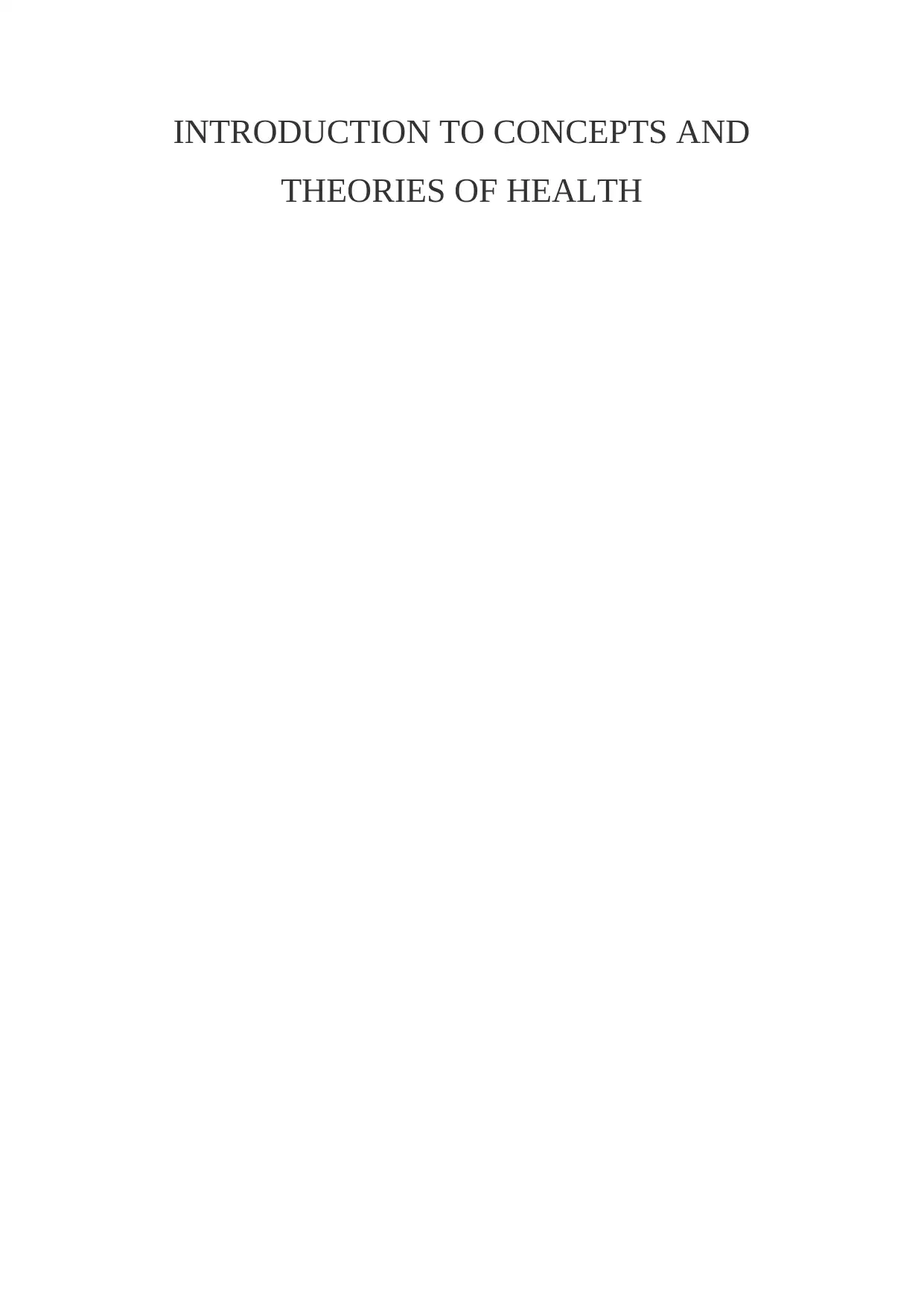
INTRODUCTION TO CONCEPTS AND
THEORIES OF HEALTH
THEORIES OF HEALTH
Paraphrase This Document
Need a fresh take? Get an instant paraphrase of this document with our AI Paraphraser
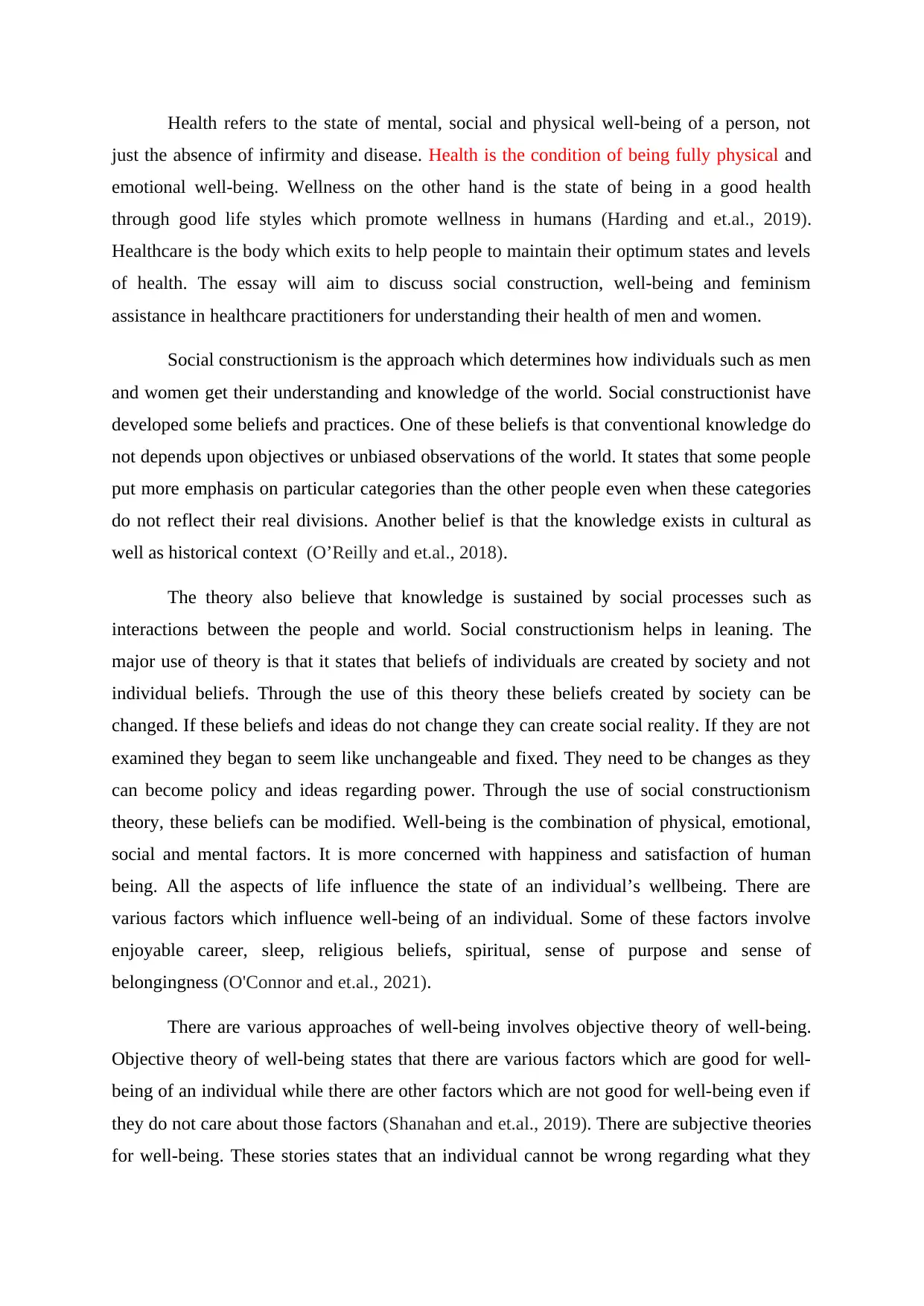
Health refers to the state of mental, social and physical well-being of a person, not
just the absence of infirmity and disease. Health is the condition of being fully physical and
emotional well-being. Wellness on the other hand is the state of being in a good health
through good life styles which promote wellness in humans (Harding and et.al., 2019).
Healthcare is the body which exits to help people to maintain their optimum states and levels
of health. The essay will aim to discuss social construction, well-being and feminism
assistance in healthcare practitioners for understanding their health of men and women.
Social constructionism is the approach which determines how individuals such as men
and women get their understanding and knowledge of the world. Social constructionist have
developed some beliefs and practices. One of these beliefs is that conventional knowledge do
not depends upon objectives or unbiased observations of the world. It states that some people
put more emphasis on particular categories than the other people even when these categories
do not reflect their real divisions. Another belief is that the knowledge exists in cultural as
well as historical context (O’Reilly and et.al., 2018).
The theory also believe that knowledge is sustained by social processes such as
interactions between the people and world. Social constructionism helps in leaning. The
major use of theory is that it states that beliefs of individuals are created by society and not
individual beliefs. Through the use of this theory these beliefs created by society can be
changed. If these beliefs and ideas do not change they can create social reality. If they are not
examined they began to seem like unchangeable and fixed. They need to be changes as they
can become policy and ideas regarding power. Through the use of social constructionism
theory, these beliefs can be modified. Well-being is the combination of physical, emotional,
social and mental factors. It is more concerned with happiness and satisfaction of human
being. All the aspects of life influence the state of an individual’s wellbeing. There are
various factors which influence well-being of an individual. Some of these factors involve
enjoyable career, sleep, religious beliefs, spiritual, sense of purpose and sense of
belongingness (O'Connor and et.al., 2021).
There are various approaches of well-being involves objective theory of well-being.
Objective theory of well-being states that there are various factors which are good for well-
being of an individual while there are other factors which are not good for well-being even if
they do not care about those factors (Shanahan and et.al., 2019). There are subjective theories
for well-being. These stories states that an individual cannot be wrong regarding what they
just the absence of infirmity and disease. Health is the condition of being fully physical and
emotional well-being. Wellness on the other hand is the state of being in a good health
through good life styles which promote wellness in humans (Harding and et.al., 2019).
Healthcare is the body which exits to help people to maintain their optimum states and levels
of health. The essay will aim to discuss social construction, well-being and feminism
assistance in healthcare practitioners for understanding their health of men and women.
Social constructionism is the approach which determines how individuals such as men
and women get their understanding and knowledge of the world. Social constructionist have
developed some beliefs and practices. One of these beliefs is that conventional knowledge do
not depends upon objectives or unbiased observations of the world. It states that some people
put more emphasis on particular categories than the other people even when these categories
do not reflect their real divisions. Another belief is that the knowledge exists in cultural as
well as historical context (O’Reilly and et.al., 2018).
The theory also believe that knowledge is sustained by social processes such as
interactions between the people and world. Social constructionism helps in leaning. The
major use of theory is that it states that beliefs of individuals are created by society and not
individual beliefs. Through the use of this theory these beliefs created by society can be
changed. If these beliefs and ideas do not change they can create social reality. If they are not
examined they began to seem like unchangeable and fixed. They need to be changes as they
can become policy and ideas regarding power. Through the use of social constructionism
theory, these beliefs can be modified. Well-being is the combination of physical, emotional,
social and mental factors. It is more concerned with happiness and satisfaction of human
being. All the aspects of life influence the state of an individual’s wellbeing. There are
various factors which influence well-being of an individual. Some of these factors involve
enjoyable career, sleep, religious beliefs, spiritual, sense of purpose and sense of
belongingness (O'Connor and et.al., 2021).
There are various approaches of well-being involves objective theory of well-being.
Objective theory of well-being states that there are various factors which are good for well-
being of an individual while there are other factors which are not good for well-being even if
they do not care about those factors (Shanahan and et.al., 2019). There are subjective theories
for well-being. These stories states that an individual cannot be wrong regarding what they
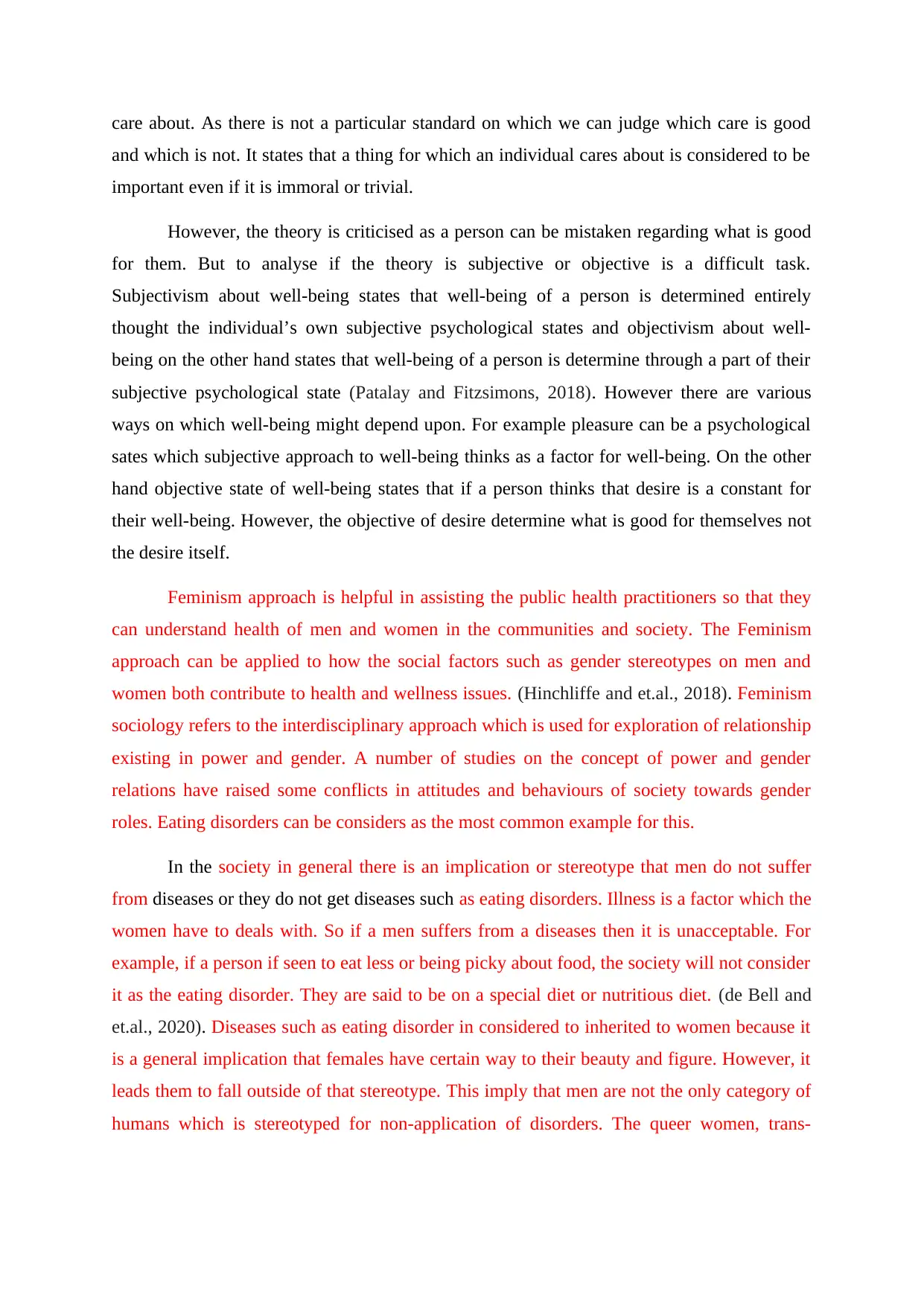
care about. As there is not a particular standard on which we can judge which care is good
and which is not. It states that a thing for which an individual cares about is considered to be
important even if it is immoral or trivial.
However, the theory is criticised as a person can be mistaken regarding what is good
for them. But to analyse if the theory is subjective or objective is a difficult task.
Subjectivism about well-being states that well-being of a person is determined entirely
thought the individual’s own subjective psychological states and objectivism about well-
being on the other hand states that well-being of a person is determine through a part of their
subjective psychological state (Patalay and Fitzsimons, 2018). However there are various
ways on which well-being might depend upon. For example pleasure can be a psychological
sates which subjective approach to well-being thinks as a factor for well-being. On the other
hand objective state of well-being states that if a person thinks that desire is a constant for
their well-being. However, the objective of desire determine what is good for themselves not
the desire itself.
Feminism approach is helpful in assisting the public health practitioners so that they
can understand health of men and women in the communities and society. The Feminism
approach can be applied to how the social factors such as gender stereotypes on men and
women both contribute to health and wellness issues. (Hinchliffe and et.al., 2018). Feminism
sociology refers to the interdisciplinary approach which is used for exploration of relationship
existing in power and gender. A number of studies on the concept of power and gender
relations have raised some conflicts in attitudes and behaviours of society towards gender
roles. Eating disorders can be considers as the most common example for this.
In the society in general there is an implication or stereotype that men do not suffer
from diseases or they do not get diseases such as eating disorders. Illness is a factor which the
women have to deals with. So if a men suffers from a diseases then it is unacceptable. For
example, if a person if seen to eat less or being picky about food, the society will not consider
it as the eating disorder. They are said to be on a special diet or nutritious diet. (de Bell and
et.al., 2020). Diseases such as eating disorder in considered to inherited to women because it
is a general implication that females have certain way to their beauty and figure. However, it
leads them to fall outside of that stereotype. This imply that men are not the only category of
humans which is stereotyped for non-application of disorders. The queer women, trans-
and which is not. It states that a thing for which an individual cares about is considered to be
important even if it is immoral or trivial.
However, the theory is criticised as a person can be mistaken regarding what is good
for them. But to analyse if the theory is subjective or objective is a difficult task.
Subjectivism about well-being states that well-being of a person is determined entirely
thought the individual’s own subjective psychological states and objectivism about well-
being on the other hand states that well-being of a person is determine through a part of their
subjective psychological state (Patalay and Fitzsimons, 2018). However there are various
ways on which well-being might depend upon. For example pleasure can be a psychological
sates which subjective approach to well-being thinks as a factor for well-being. On the other
hand objective state of well-being states that if a person thinks that desire is a constant for
their well-being. However, the objective of desire determine what is good for themselves not
the desire itself.
Feminism approach is helpful in assisting the public health practitioners so that they
can understand health of men and women in the communities and society. The Feminism
approach can be applied to how the social factors such as gender stereotypes on men and
women both contribute to health and wellness issues. (Hinchliffe and et.al., 2018). Feminism
sociology refers to the interdisciplinary approach which is used for exploration of relationship
existing in power and gender. A number of studies on the concept of power and gender
relations have raised some conflicts in attitudes and behaviours of society towards gender
roles. Eating disorders can be considers as the most common example for this.
In the society in general there is an implication or stereotype that men do not suffer
from diseases or they do not get diseases such as eating disorders. Illness is a factor which the
women have to deals with. So if a men suffers from a diseases then it is unacceptable. For
example, if a person if seen to eat less or being picky about food, the society will not consider
it as the eating disorder. They are said to be on a special diet or nutritious diet. (de Bell and
et.al., 2020). Diseases such as eating disorder in considered to inherited to women because it
is a general implication that females have certain way to their beauty and figure. However, it
leads them to fall outside of that stereotype. This imply that men are not the only category of
humans which is stereotyped for non-application of disorders. The queer women, trans-
⊘ This is a preview!⊘
Do you want full access?
Subscribe today to unlock all pages.

Trusted by 1+ million students worldwide
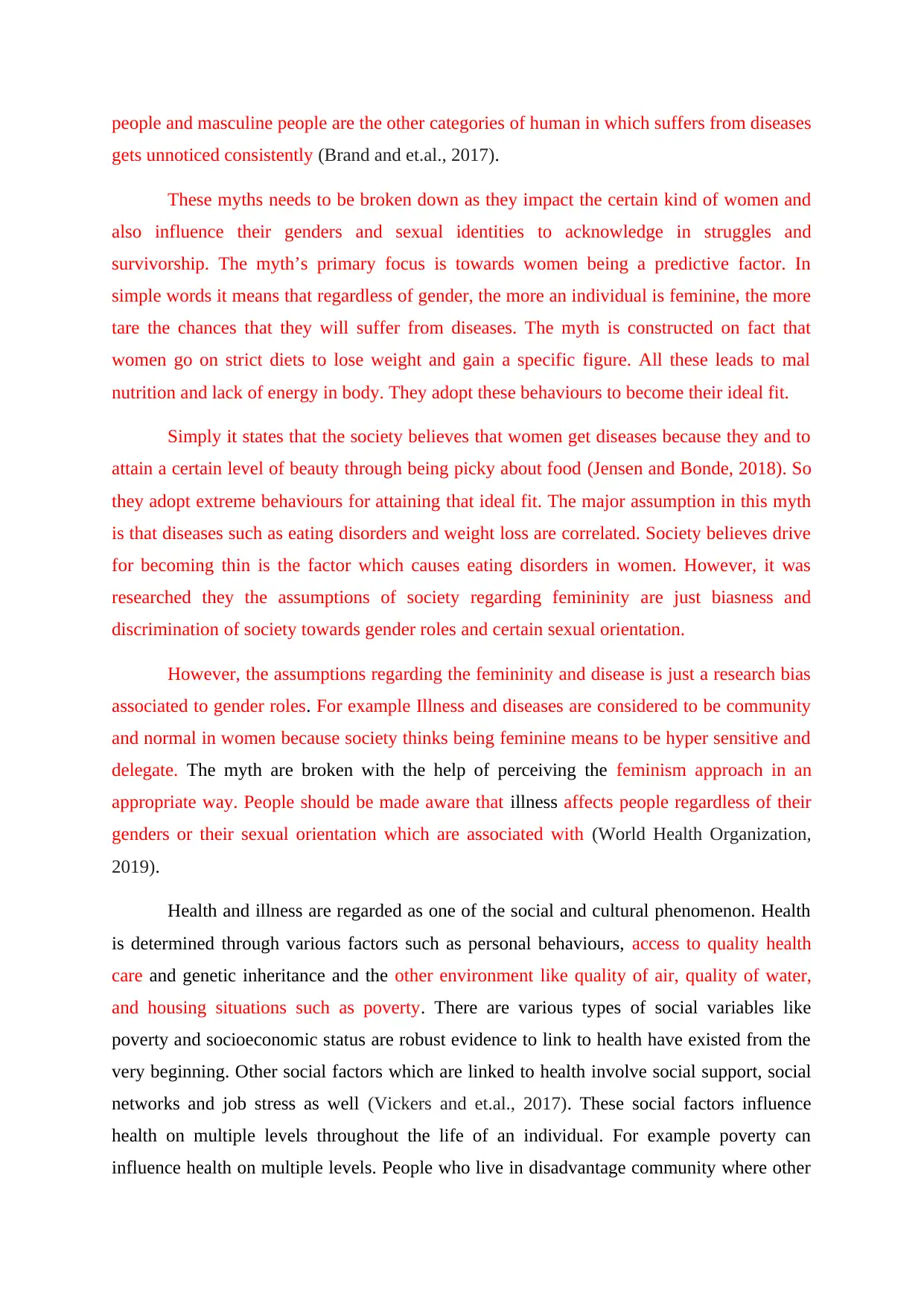
people and masculine people are the other categories of human in which suffers from diseases
gets unnoticed consistently (Brand and et.al., 2017).
These myths needs to be broken down as they impact the certain kind of women and
also influence their genders and sexual identities to acknowledge in struggles and
survivorship. The myth’s primary focus is towards women being a predictive factor. In
simple words it means that regardless of gender, the more an individual is feminine, the more
tare the chances that they will suffer from diseases. The myth is constructed on fact that
women go on strict diets to lose weight and gain a specific figure. All these leads to mal
nutrition and lack of energy in body. They adopt these behaviours to become their ideal fit.
Simply it states that the society believes that women get diseases because they and to
attain a certain level of beauty through being picky about food (Jensen and Bonde, 2018). So
they adopt extreme behaviours for attaining that ideal fit. The major assumption in this myth
is that diseases such as eating disorders and weight loss are correlated. Society believes drive
for becoming thin is the factor which causes eating disorders in women. However, it was
researched they the assumptions of society regarding femininity are just biasness and
discrimination of society towards gender roles and certain sexual orientation.
However, the assumptions regarding the femininity and disease is just a research bias
associated to gender roles. For example Illness and diseases are considered to be community
and normal in women because society thinks being feminine means to be hyper sensitive and
delegate. The myth are broken with the help of perceiving the feminism approach in an
appropriate way. People should be made aware that illness affects people regardless of their
genders or their sexual orientation which are associated with (World Health Organization,
2019).
Health and illness are regarded as one of the social and cultural phenomenon. Health
is determined through various factors such as personal behaviours, access to quality health
care and genetic inheritance and the other environment like quality of air, quality of water,
and housing situations such as poverty. There are various types of social variables like
poverty and socioeconomic status are robust evidence to link to health have existed from the
very beginning. Other social factors which are linked to health involve social support, social
networks and job stress as well (Vickers and et.al., 2017). These social factors influence
health on multiple levels throughout the life of an individual. For example poverty can
influence health on multiple levels. People who live in disadvantage community where other
gets unnoticed consistently (Brand and et.al., 2017).
These myths needs to be broken down as they impact the certain kind of women and
also influence their genders and sexual identities to acknowledge in struggles and
survivorship. The myth’s primary focus is towards women being a predictive factor. In
simple words it means that regardless of gender, the more an individual is feminine, the more
tare the chances that they will suffer from diseases. The myth is constructed on fact that
women go on strict diets to lose weight and gain a specific figure. All these leads to mal
nutrition and lack of energy in body. They adopt these behaviours to become their ideal fit.
Simply it states that the society believes that women get diseases because they and to
attain a certain level of beauty through being picky about food (Jensen and Bonde, 2018). So
they adopt extreme behaviours for attaining that ideal fit. The major assumption in this myth
is that diseases such as eating disorders and weight loss are correlated. Society believes drive
for becoming thin is the factor which causes eating disorders in women. However, it was
researched they the assumptions of society regarding femininity are just biasness and
discrimination of society towards gender roles and certain sexual orientation.
However, the assumptions regarding the femininity and disease is just a research bias
associated to gender roles. For example Illness and diseases are considered to be community
and normal in women because society thinks being feminine means to be hyper sensitive and
delegate. The myth are broken with the help of perceiving the feminism approach in an
appropriate way. People should be made aware that illness affects people regardless of their
genders or their sexual orientation which are associated with (World Health Organization,
2019).
Health and illness are regarded as one of the social and cultural phenomenon. Health
is determined through various factors such as personal behaviours, access to quality health
care and genetic inheritance and the other environment like quality of air, quality of water,
and housing situations such as poverty. There are various types of social variables like
poverty and socioeconomic status are robust evidence to link to health have existed from the
very beginning. Other social factors which are linked to health involve social support, social
networks and job stress as well (Vickers and et.al., 2017). These social factors influence
health on multiple levels throughout the life of an individual. For example poverty can
influence health on multiple levels. People who live in disadvantage community where other
Paraphrase This Document
Need a fresh take? Get an instant paraphrase of this document with our AI Paraphraser
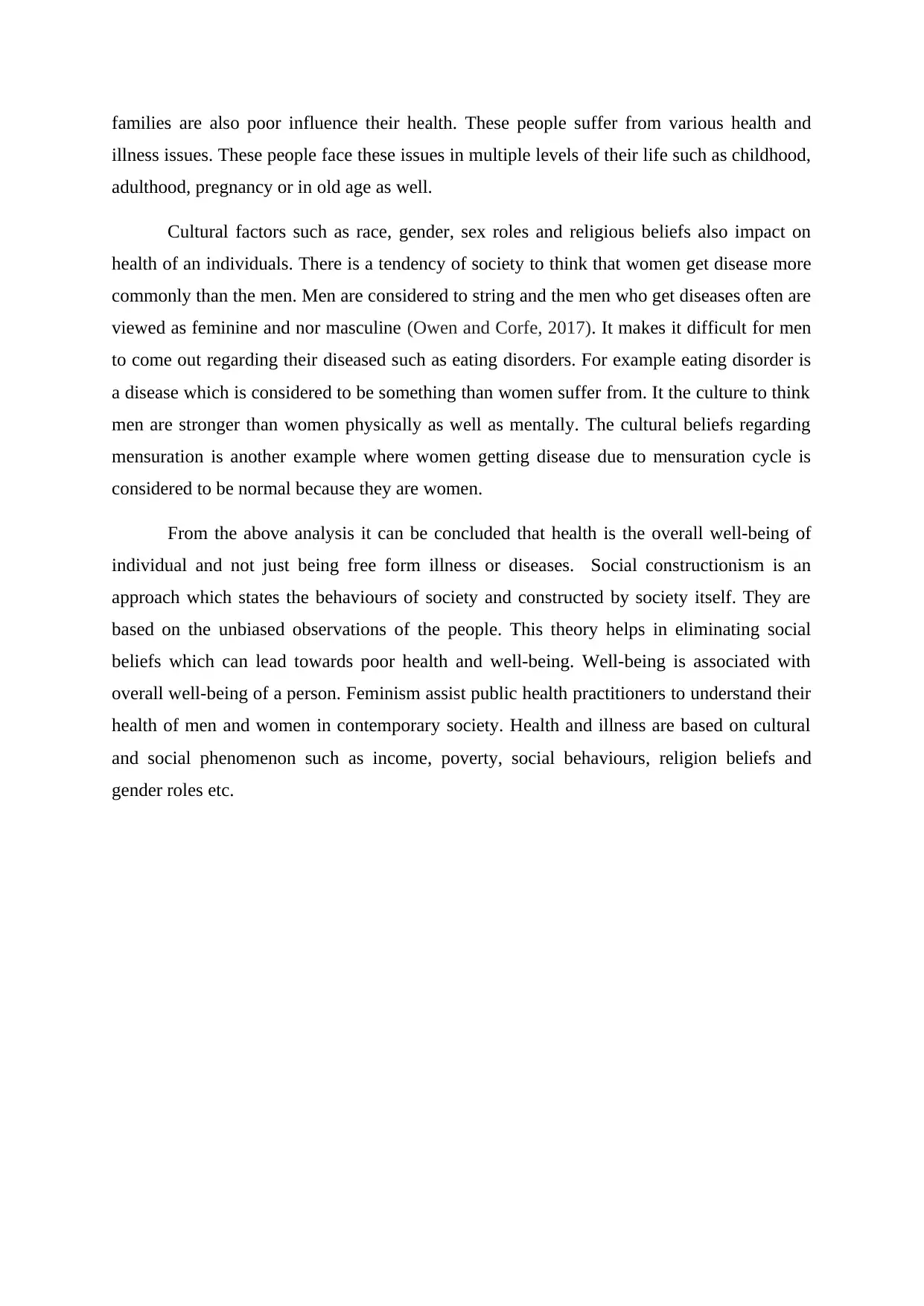
families are also poor influence their health. These people suffer from various health and
illness issues. These people face these issues in multiple levels of their life such as childhood,
adulthood, pregnancy or in old age as well.
Cultural factors such as race, gender, sex roles and religious beliefs also impact on
health of an individuals. There is a tendency of society to think that women get disease more
commonly than the men. Men are considered to string and the men who get diseases often are
viewed as feminine and nor masculine (Owen and Corfe, 2017). It makes it difficult for men
to come out regarding their diseased such as eating disorders. For example eating disorder is
a disease which is considered to be something than women suffer from. It the culture to think
men are stronger than women physically as well as mentally. The cultural beliefs regarding
mensuration is another example where women getting disease due to mensuration cycle is
considered to be normal because they are women.
From the above analysis it can be concluded that health is the overall well-being of
individual and not just being free form illness or diseases. Social constructionism is an
approach which states the behaviours of society and constructed by society itself. They are
based on the unbiased observations of the people. This theory helps in eliminating social
beliefs which can lead towards poor health and well-being. Well-being is associated with
overall well-being of a person. Feminism assist public health practitioners to understand their
health of men and women in contemporary society. Health and illness are based on cultural
and social phenomenon such as income, poverty, social behaviours, religion beliefs and
gender roles etc.
illness issues. These people face these issues in multiple levels of their life such as childhood,
adulthood, pregnancy or in old age as well.
Cultural factors such as race, gender, sex roles and religious beliefs also impact on
health of an individuals. There is a tendency of society to think that women get disease more
commonly than the men. Men are considered to string and the men who get diseases often are
viewed as feminine and nor masculine (Owen and Corfe, 2017). It makes it difficult for men
to come out regarding their diseased such as eating disorders. For example eating disorder is
a disease which is considered to be something than women suffer from. It the culture to think
men are stronger than women physically as well as mentally. The cultural beliefs regarding
mensuration is another example where women getting disease due to mensuration cycle is
considered to be normal because they are women.
From the above analysis it can be concluded that health is the overall well-being of
individual and not just being free form illness or diseases. Social constructionism is an
approach which states the behaviours of society and constructed by society itself. They are
based on the unbiased observations of the people. This theory helps in eliminating social
beliefs which can lead towards poor health and well-being. Well-being is associated with
overall well-being of a person. Feminism assist public health practitioners to understand their
health of men and women in contemporary society. Health and illness are based on cultural
and social phenomenon such as income, poverty, social behaviours, religion beliefs and
gender roles etc.
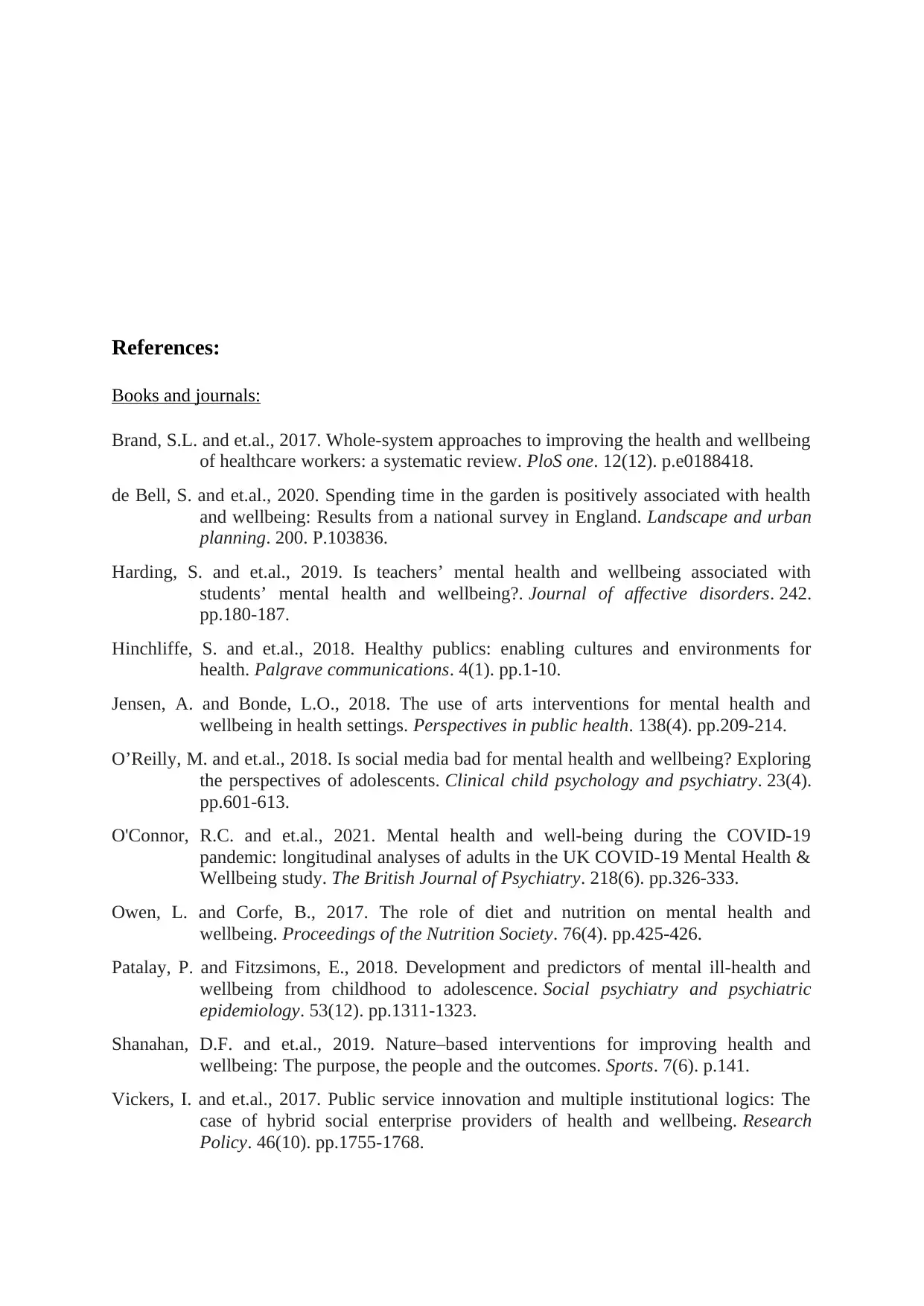
References:
Books and journals:
Brand, S.L. and et.al., 2017. Whole-system approaches to improving the health and wellbeing
of healthcare workers: a systematic review. PloS one. 12(12). p.e0188418.
de Bell, S. and et.al., 2020. Spending time in the garden is positively associated with health
and wellbeing: Results from a national survey in England. Landscape and urban
planning. 200. P.103836.
Harding, S. and et.al., 2019. Is teachers’ mental health and wellbeing associated with
students’ mental health and wellbeing?. Journal of affective disorders. 242.
pp.180-187.
Hinchliffe, S. and et.al., 2018. Healthy publics: enabling cultures and environments for
health. Palgrave communications. 4(1). pp.1-10.
Jensen, A. and Bonde, L.O., 2018. The use of arts interventions for mental health and
wellbeing in health settings. Perspectives in public health. 138(4). pp.209-214.
O’Reilly, M. and et.al., 2018. Is social media bad for mental health and wellbeing? Exploring
the perspectives of adolescents. Clinical child psychology and psychiatry. 23(4).
pp.601-613.
O'Connor, R.C. and et.al., 2021. Mental health and well-being during the COVID-19
pandemic: longitudinal analyses of adults in the UK COVID-19 Mental Health &
Wellbeing study. The British Journal of Psychiatry. 218(6). pp.326-333.
Owen, L. and Corfe, B., 2017. The role of diet and nutrition on mental health and
wellbeing. Proceedings of the Nutrition Society. 76(4). pp.425-426.
Patalay, P. and Fitzsimons, E., 2018. Development and predictors of mental ill-health and
wellbeing from childhood to adolescence. Social psychiatry and psychiatric
epidemiology. 53(12). pp.1311-1323.
Shanahan, D.F. and et.al., 2019. Nature–based interventions for improving health and
wellbeing: The purpose, the people and the outcomes. Sports. 7(6). p.141.
Vickers, I. and et.al., 2017. Public service innovation and multiple institutional logics: The
case of hybrid social enterprise providers of health and wellbeing. Research
Policy. 46(10). pp.1755-1768.
Books and journals:
Brand, S.L. and et.al., 2017. Whole-system approaches to improving the health and wellbeing
of healthcare workers: a systematic review. PloS one. 12(12). p.e0188418.
de Bell, S. and et.al., 2020. Spending time in the garden is positively associated with health
and wellbeing: Results from a national survey in England. Landscape and urban
planning. 200. P.103836.
Harding, S. and et.al., 2019. Is teachers’ mental health and wellbeing associated with
students’ mental health and wellbeing?. Journal of affective disorders. 242.
pp.180-187.
Hinchliffe, S. and et.al., 2018. Healthy publics: enabling cultures and environments for
health. Palgrave communications. 4(1). pp.1-10.
Jensen, A. and Bonde, L.O., 2018. The use of arts interventions for mental health and
wellbeing in health settings. Perspectives in public health. 138(4). pp.209-214.
O’Reilly, M. and et.al., 2018. Is social media bad for mental health and wellbeing? Exploring
the perspectives of adolescents. Clinical child psychology and psychiatry. 23(4).
pp.601-613.
O'Connor, R.C. and et.al., 2021. Mental health and well-being during the COVID-19
pandemic: longitudinal analyses of adults in the UK COVID-19 Mental Health &
Wellbeing study. The British Journal of Psychiatry. 218(6). pp.326-333.
Owen, L. and Corfe, B., 2017. The role of diet and nutrition on mental health and
wellbeing. Proceedings of the Nutrition Society. 76(4). pp.425-426.
Patalay, P. and Fitzsimons, E., 2018. Development and predictors of mental ill-health and
wellbeing from childhood to adolescence. Social psychiatry and psychiatric
epidemiology. 53(12). pp.1311-1323.
Shanahan, D.F. and et.al., 2019. Nature–based interventions for improving health and
wellbeing: The purpose, the people and the outcomes. Sports. 7(6). p.141.
Vickers, I. and et.al., 2017. Public service innovation and multiple institutional logics: The
case of hybrid social enterprise providers of health and wellbeing. Research
Policy. 46(10). pp.1755-1768.
⊘ This is a preview!⊘
Do you want full access?
Subscribe today to unlock all pages.

Trusted by 1+ million students worldwide

World Health Organization, 2019. What is the evidence on the role of the arts in improving
health and well-being? A scoping review. World Health Organization. Regional
Office for Europe.
health and well-being? A scoping review. World Health Organization. Regional
Office for Europe.
1 out of 7
Related Documents
Your All-in-One AI-Powered Toolkit for Academic Success.
+13062052269
info@desklib.com
Available 24*7 on WhatsApp / Email
![[object Object]](/_next/static/media/star-bottom.7253800d.svg)
Unlock your academic potential
Copyright © 2020–2026 A2Z Services. All Rights Reserved. Developed and managed by ZUCOL.




